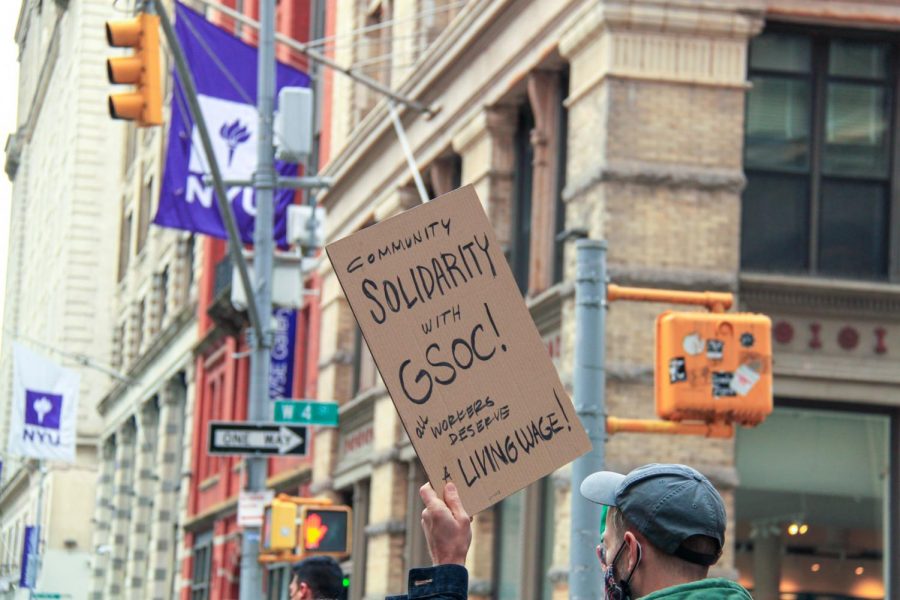NYU course assistants demand $1.3 million in missing back pay
The university’s graduate student union is calling on NYU to compensate course assistants for back pay included in a summer 2022 settlement.
File photo: A rally held by the Graduate Student Organizing Committee in 2021. (Alexandra Chan for WSN)
April 27, 2023
Andrea Ho, a second-year in the Graduate School of Arts & Science, spent the 2021-22 academic year as a course assistant at the school, working 10 to 20 hours per week grading classwork, replying to emails and running administrative errands. At the time, Ho was paid for her work in a stipend of around $3,500 per semester, which she said was not nearly enough to cover her living expenses.
Ho was relieved when in summer 2022, NYU came to a settlement agreement with the university’s graduate student union — GSOC-UAW Local 2110 — to distribute $1.3 million in back-dated hourly pay for course assistants who worked between spring 2021 and spring 2022.
While, as part of the agreement, Ho and the other course assistants at NYU have received hourly pay during the 2022-23 academic year, she is one of hundreds who have yet to receive back pay for their work in previous semesters.
“Not having the correct salary for [fall 2021] did have an impact,” Ho said. “I was counting on a certain amount of money to live in New York and be a graduate student.”
On April 14, the union wrote a petition to President Andrew Hamilton, president-designate Linda Mills and other university administrators claiming that NYU is violating the 2022 settlement agreement by withholding back pay funds from course assistants. GSOC plans to rally outside of Bobst Library on Monday, May 1 before delivering the petition directly to Hamilton’s office.
The settlement agreement was the university’s response to a grievance GSOC filed in June 2021 claiming course assistants were not being paid in line with the union’s contract with NYU. The grievance came after several course assistants received letters from their departments before spring 2021 describing their work appointments — up to 20 hours of work per week for a $3,500 stipend at the end of the semester.
When the union’s new contract was ratified in June, a $26 minimum wage amount was included for back pay for work during the 2020-21 academic year, a higher wage than course assistants were paid.
Tova Benjamin, a Ph.D. student at NYU and GSOC representative, said the departmental letters to course assistants were changed to reflect the correct hourly compensation amount in fall 2022. Benjamin added that as part of the agreement, all current course assistants are being paid an hourly rate as determined by their respective departments and the union’s contract.
“Dealing with NYU is like dealing with 40 different employers,” Benjamin said. “We win such a huge sum, and then the university takes two years to pay it back. We already started to feel them under the pressure, and we are hopeful that we can get them moving a little bit quicker if they get a sense of how urgent this is for our members.”
In May 2021, the union reached a tentative contract agreement with NYU after a three-week-long strike, gaining improved health care coverage, an increase in hourly minimum wage and other benefits. Under the contract, the university must pay course assistants and other graduate student workers a set hourly minimum wage — an amount that increases every year that the contract is active.
University spokesperson John Beckman said that NYU has thoroughly looked over the case since the summer 2022 settlement agreement and will seek an updated agreement with the union this week.
“The university takes it as a matter of principle that we are honor-bound to pay every employee what they are rightly owed,” Beckman said. “We hope that this will come to an expeditious resolution.”
Anila Gill, a member of GSOC, said the university has not communicated with the union since the April 14 petition began circulating. Gill added that in ongoing monthly meetings with the union, NYU has not provided an explanation for why course assistants were not paid on an hourly basis prior to 2022.
“In negotiations, NYU would say that it was traditional to pay course assistants in a lump sum and they’ve been doing it this way for years,” Gill said. “That was their only line of defense and it was pretty weak.”
Contact Yezen Saadah at [email protected].




























































































































































